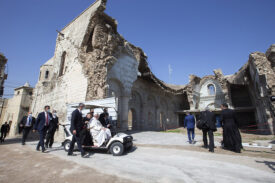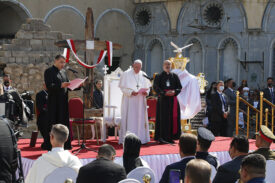
By Inés San Martín
ROME (Crux) — Eight months after visiting Iraq’s war-torn city Mosul, Pope Francis sent a message to the citizens, saying that he remembers the destruction he witnessed.
“I pray that the Lord will visit Mosul, and give her consolation after so much suffering,” Pope Francis said. “I pray for all the citizens who died, those who were tortured, those who suffered violence. I pray for the families that today are working to rebuild the city. I pray for friendship among the people of Mosul. All brothers. I pray for Mosul.”
“I remember the destroyed Churches … May the Lord help everyone to rebuild this city!” The Holy Father said.
Pope Francis’ words to Mosul came in the form of a video recorded by historian turned journalist Omar Mohammed, who runs the blog Mosul Eye. He played a key role in keeping the world informed of the atrocities perpetrated by the Islamic State Group — called Daesh by its victims — during the 2014-2017 occupation of the city.
On Tuesday, the pontiff welcomed Mohammed at his residence in the Casa Santa Marta. Mohammed sent the video to Crux later that day.
The journalist shared several moments of his encounter with Pope Francis on Twitter, including that he called him personally to make the appointment: “That was the funniest and the most beautiful part of it all. He said, I wanted to do everything myself, call you and invite you. He is so cool and fun,” Mohammed wrote.
He also said Pope Francis asked to be recorded so that he could send a message to the people of Mosul.
Pope Francis made history earlier this year when he became the first pope to visit Iraq, the land of Abraham. On March 7, the city of Mosul did its best to show the pontiff why, before being the stronghold of a terrorist organization, it was known as a crossroads of tolerance.
The Argentine had the opportunity to get a bird’s eye view of the devastation caused by the war during his helicopter ride from the nearby city of Erbil, the capital of Kurdistan.
Mosul is the administrative capital of Nineveh, and for the past 2,500 years, it has represented the pluralistic identity of the region. The rise of ISIS, and the war that followed, caused vast damage to the city’s skyline, destroying landmarks such as the Al-Hadba minaret of the Al-Nouri Mosque and the clock tower of the Church of Our Lady of the Hour, the first of its kind in the Middle East.
The Nineveh Plains is a conglomerate of small villages, many of them historically Christian: Teleskof, Batnaya, Bartella, Karamles, Qaraqosh, and others.
During his visit, Pope Francis defined the damaged structures as reminders of the “perennial human desire for closeness” to God. The clock, he added, “for more than a century has reminded passers-by that life is short and that time is precious.”

With the help of private NGOs such as the papal organization Aid to the Church in Need, the Knights of Columbus, and the Hungarian government, thousands of Christian families have been able to go home after the region was liberated.
The mosque and the church are being rebuilt through the UN-sponsored program “Revive the Spirit of Mosul,” financed by the United Arab Emirates. This is a concrete result of Pope Francis’ historic Declaration on Human Fraternity, which he signed in 2019 with the Grand Imam of al-Azhar, Cairo’s Sunni university.
In the former capital of the self-proclaimed Islamic caliphate, Pope Francis reaffirmed the conviction that “fraternity is more durable than fratricide, that hope is more powerful than hatred, that peace more powerful than war.”
French-born Dominican Father Olivier Poquillon, who works in Mosul, told Crux earlier this month that the visit had a “very positive impact on Iraq.”
“It was something positive, and Iraqi people were bringing something good to the world, instead of being the suffering ones,” he said. “The vast majority of Iraqis are Muslims, but all of them participated in welcoming the pope.”
As he was leaving Mosul, Pope Francis stopped the car and greeted a group of children who were playing on a nearby street. Father Poquillon later asked their grandfather if they knew who he was, to which the man said “no, but we know he was a man of God and he visited us.”
The priest said that was the significance of Pope Francis’ visit to Iraq: “He opened the door to the weakest, to a suffering people and brought them back within the [global] community.”
